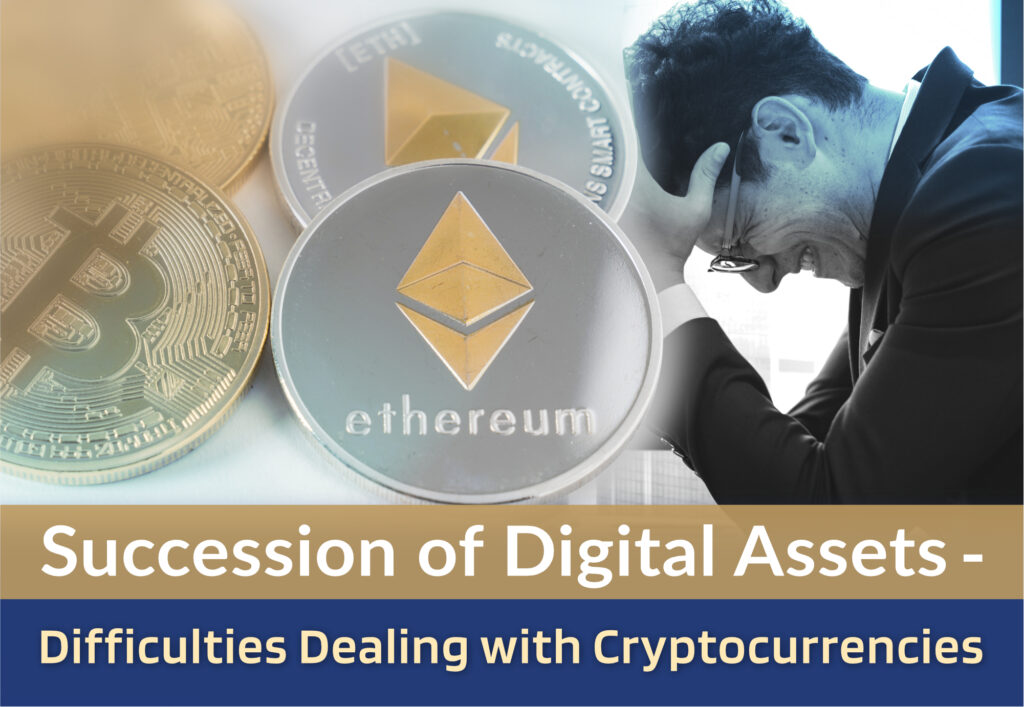In part 2 of this Case Study, we looked at how executors go about handling digital assets of financial value. We noted that it is prudent for executors to have an indemnity clause in a Will in relation to such assets. It is also important to enhance the role of Digital Facilitator within a Will when it comes to digital assets of financial value. This will help executors to ascertain the presence and value of all such assets in a deceased person’s estate, helping to stave off potential disputes from beneficiaries.
It should be stressed that cryptocurrencies can represent a legal quagmire in estate planning. “Legal experts describe them as property interests, but they have no form as well as no rights or obligations attached to them,” notes PreceptsGroup International Chief Executive Officer Lee Chiwi.
A holder of cryptocurrency cannot point to anything tangible that represents his asset. Trying to describe gifts of bitcoins and other cryptocurrencies in a Will with legal clarity is akin to engaging in legal gymnastics. It is not enough to simply include the cryptocurrency in a Will, as one would with a real estate asset.
Without the necessary information on the existence of a cryptocurrency and how to access it, beneficiaries will not be served properly. Further, even with instructions, beneficiaries could still have a difficult time navigating this process. However, cryptocurrency presents a challenge when adding it to a Will — how safe is the information in the Will from prying eyes.
Memorandum for greater clarity
This is because as Will go through probate, they become part of the public record. Including too much detail, such as the passwords and PINs, directly in a Will, could create a security issue. This need for security suggests that attaching a specific memorandum with a Will rather than listing sensitive information in the Will itself, is needed.
The memorandum would be a separate document that’s referenced in the Will but is not part of the Will itself. A memorandum typically doesn’t become part of the public record and is a good privacy option. Since a memorandum is a separate document, it can be updated as often as needed without going through the formalities of changing or updating a Will.
It should include the type of digital wallets the testator has set up, as well as any computer, smartphone, or device in which the cryptocurrency is stored. There should also be information on website links for any required online exchanges or password managers, and any login and password information needed for each of these wallets, accounts, and websites. The cryptocurrency memorandum can be kept with the Will or in a separate location with other estate planning documents.
One method that is used to overcome difficulties with bequeathing cryptocurrencies is to arrange things so that the beneficiaries receive the value of that investment instead. This requires the executor to have the technical skills needed to exchange cryptocurrency for traditional cash. If the executor doesn’t have such skills, he can turn to a trusted party like the named Digital Facilitator.
Overall, while all it takes to administer cryptocurrency in a Will is a multi-character passcode needed to access, invest and distribute the estate’s cryptocurrency assets, safeguards have to be put in place to avoid any abuse. PreceptsGroup’s stance is that “the focus of the executor should be on how the passcode should be securely conveyed to the Digital Facilitator,” adds Mr Lee.
Finally, in the Will itself, clarity is needed about who is going to be the beneficiary of cryptocurrencies. A simple statement in the Will such as “I give my bitcoin to ABC and all my Ethereum to DEF” should suffice. With these instructions, the executor can be more effective in taking the appropriate action.










